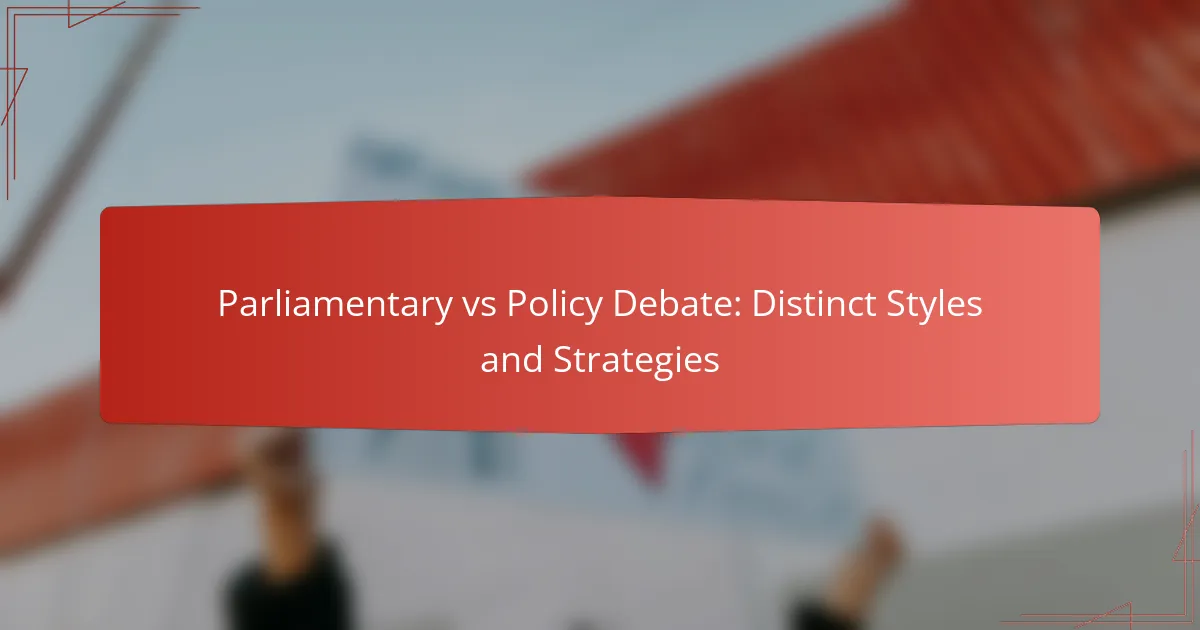As policy debate transitions to online formats, it is essential to implement strategies that enhance engagement and streamline the experience for both participants and judges. By leveraging technology and establishing clear evaluation criteria, competitions can maintain their rigor while adapting to the virtual landscape. Additionally, thorough preparation and training for debaters will ensure they navigate the digital environment with confidence and professionalism.
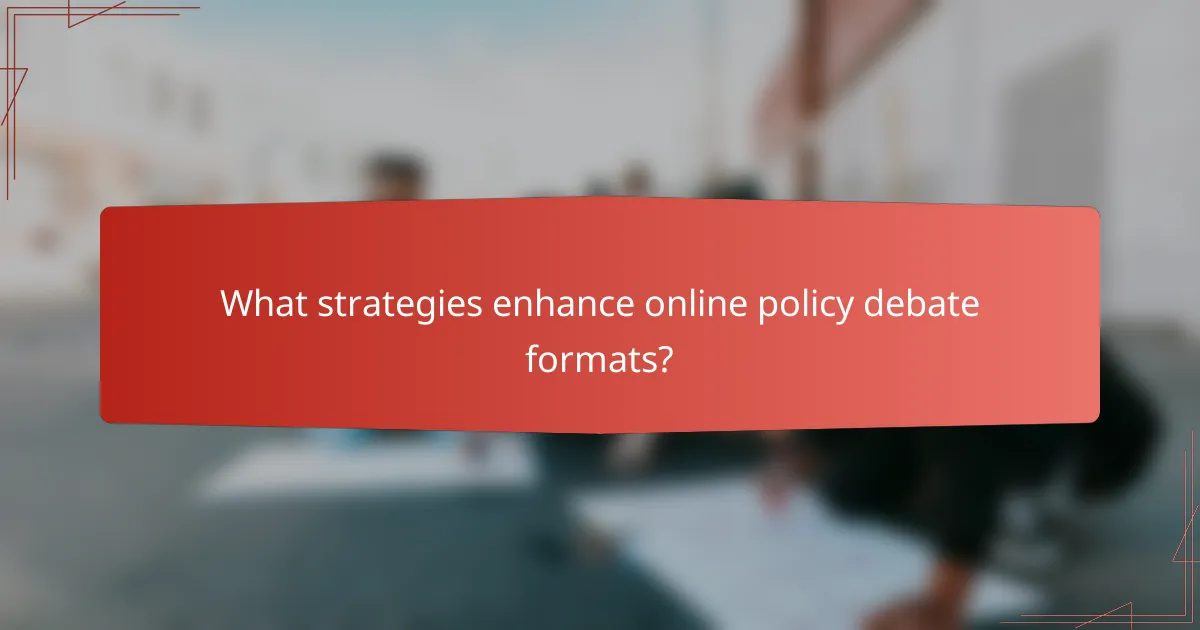
What strategies enhance online policy debate formats?
To enhance online policy debate formats, strategies should focus on leveraging technology, fostering engagement, and ensuring effective time management. These approaches can significantly improve the overall experience for both debaters and audiences.
Utilizing digital platforms like Zoom
Digital platforms such as Zoom provide a versatile environment for online policy debates. They allow for real-time interaction, video conferencing, and screen sharing, which can facilitate presentations and visual aids. Ensure that all participants are familiar with the platform’s features to maximize its potential.
Consider using breakout rooms for smaller group discussions or practice rounds, which can mimic traditional debate formats. This setup can help maintain the dynamic nature of debates while accommodating the online format.
Incorporating interactive tools such as Poll Everywhere
Interactive tools like Poll Everywhere can enhance audience participation and feedback during online debates. These tools allow viewers to vote on arguments or ask questions in real-time, making the experience more engaging. Incorporating polls can also provide immediate insights into audience opinions, which can be valuable for debaters.
To effectively use these tools, plan specific moments in the debate for audience interaction. This can help maintain focus and ensure that the audience feels involved throughout the session.
Implementing time management software
Time management software is crucial in online policy debates to ensure that speakers adhere to their allotted time. Tools like Timer or Debate Timer can provide visual cues for speakers, helping them manage their arguments effectively. This is particularly important in a virtual setting where distractions may arise.
Establish clear time limits for each segment of the debate and communicate these to all participants beforehand. This practice helps maintain structure and keeps the debate moving smoothly.
Encouraging audience engagement through chat features
Chat features in online platforms can significantly enhance audience engagement during policy debates. They allow viewers to share thoughts, ask questions, and interact with debaters in real-time. Encourage participants to use the chat for questions or comments, fostering a more interactive atmosphere.
To manage the flow of conversation, designate a moderator to monitor the chat and select questions for debaters to address. This approach ensures that the debate remains focused while still allowing for audience input.

How can judges effectively evaluate online debates?
Judges can effectively evaluate online debates by focusing on clear criteria and adapting their methods to the virtual environment. This involves establishing specific evaluation standards and utilizing scoring rubrics designed for online formats.
Establishing clear evaluation criteria
Clear evaluation criteria are essential for maintaining consistency and fairness in judging online debates. Judges should define key aspects such as argument quality, delivery, engagement, and adherence to time limits. This clarity helps participants understand expectations and allows judges to provide focused feedback.
Consider creating a checklist that includes elements like clarity of arguments, use of evidence, and rebuttal effectiveness. This can streamline the evaluation process and ensure that all judges are aligned in their assessments.
Using scoring rubrics tailored for virtual formats
Scoring rubrics specifically designed for virtual debates can enhance the evaluation process by providing structured feedback. These rubrics should reflect the unique aspects of online communication, such as visual presence and technical proficiency. For example, judges might assess how well debaters utilize visual aids or manage their audio and video quality.
Incorporating a numerical scoring system can help quantify performance across different criteria. A simple rubric might include categories like argument strength (1-5), delivery (1-5), and engagement (1-5), allowing for a comprehensive overview of each debater’s performance. This approach not only aids in decision-making but also offers clear feedback for participants to improve their skills.
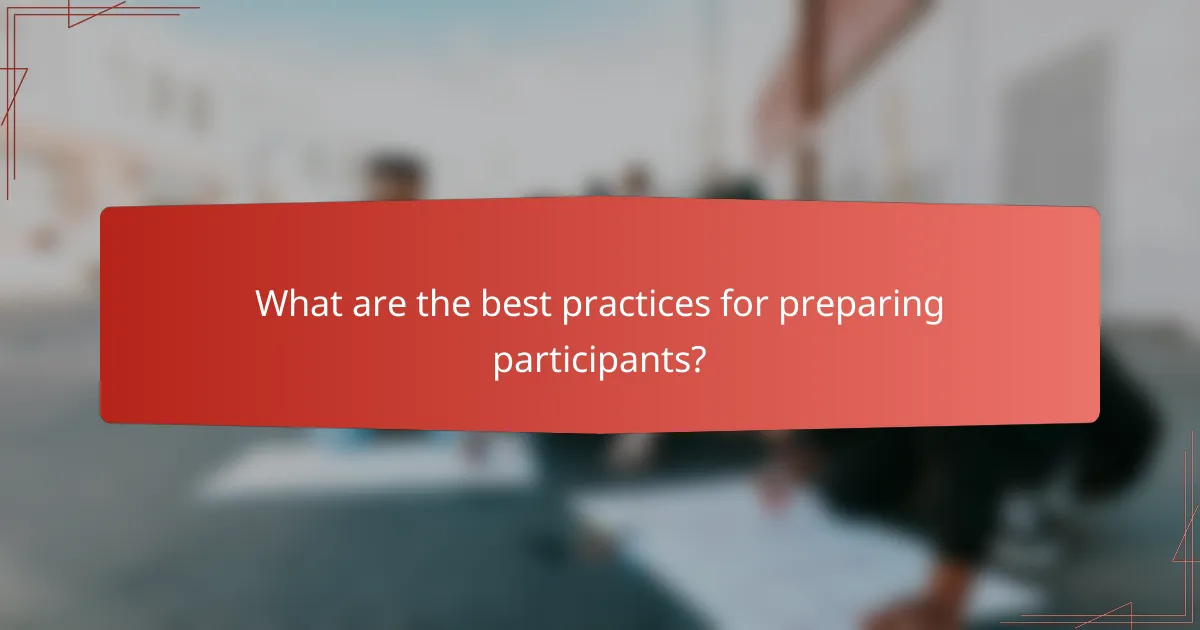
What are the best practices for preparing participants?
Preparing participants for online policy debate competitions involves focused training and clear guidelines on virtual etiquette. Effective preparation ensures that debaters can perform confidently and competently in a digital environment.
Conducting virtual training sessions
Virtual training sessions should be structured to mimic the actual competition environment. Utilize video conferencing tools that allow for screen sharing, breakout rooms, and recording features to facilitate practice debates and feedback sessions.
Consider scheduling regular practice rounds, ideally weekly, to help participants become familiar with the technology and format. Encourage participants to engage in mock debates with peers to build confidence and refine their arguments.
Providing resources on online debate etiquette
Online debate etiquette is crucial for maintaining professionalism and respect during competitions. Provide participants with guidelines that cover appropriate dress codes, speaking turns, and how to handle technical issues gracefully.
Encourage debaters to use clear and respectful language, avoid interrupting others, and be mindful of their body language on camera. Creating a checklist of dos and don’ts can help reinforce these etiquette standards and enhance the overall experience for all participants.
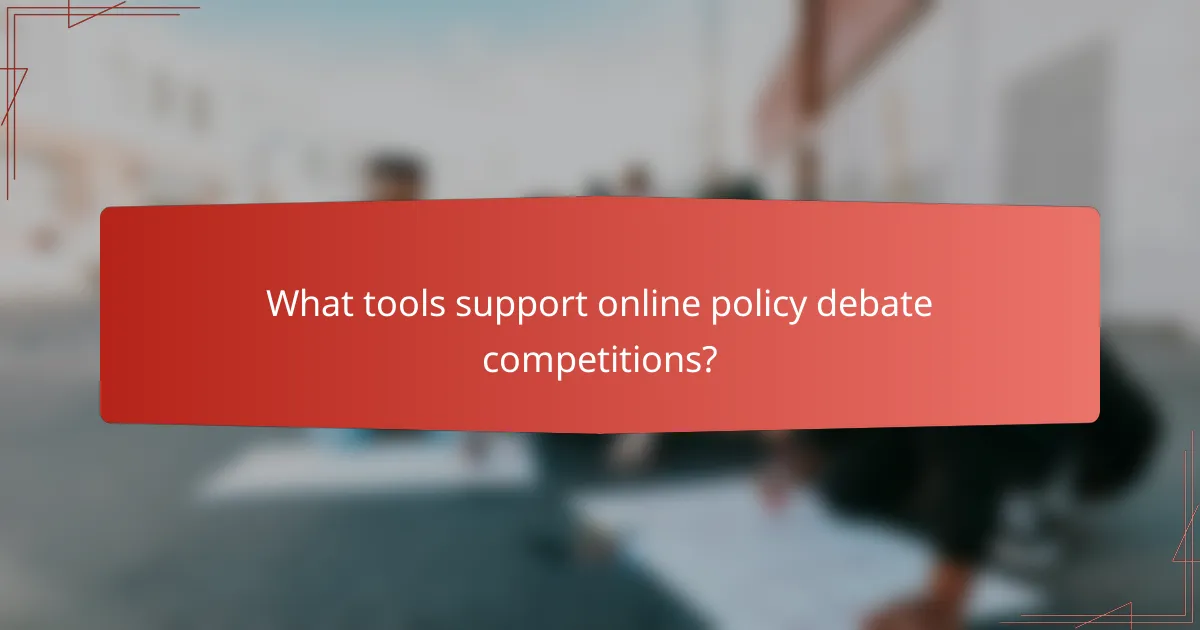
What tools support online policy debate competitions?
Online policy debate competitions rely on various tools that enhance communication, organization, and argumentation. Key platforms facilitate structured discussions, collaborative note-taking, and real-time feedback, making debates more efficient and effective.
Leveraging platforms like Kialo for structured arguments
Kialo is a powerful platform designed specifically for structured argumentation, making it ideal for policy debates. It allows users to create a visual map of arguments and counterarguments, helping participants see the flow of discussion and the relationships between points.
To maximize Kialo’s effectiveness, teams should establish clear categories for arguments and ensure that each point is backed by evidence. This structured approach not only clarifies the debate but also aids in preparing rebuttals and supporting claims.
Using Google Docs for collaborative note-taking
Google Docs is an excellent tool for collaborative note-taking during online policy debates. It allows multiple users to edit and comment in real-time, ensuring that all team members can contribute their insights and track developments easily.
To optimize Google Docs for debate preparation, create a shared document with sections for each argument, evidence, and counterpoints. Utilize features like comments and suggestions to facilitate discussion and refine ideas. Regularly update the document to reflect new information and strategies as the debate progresses.
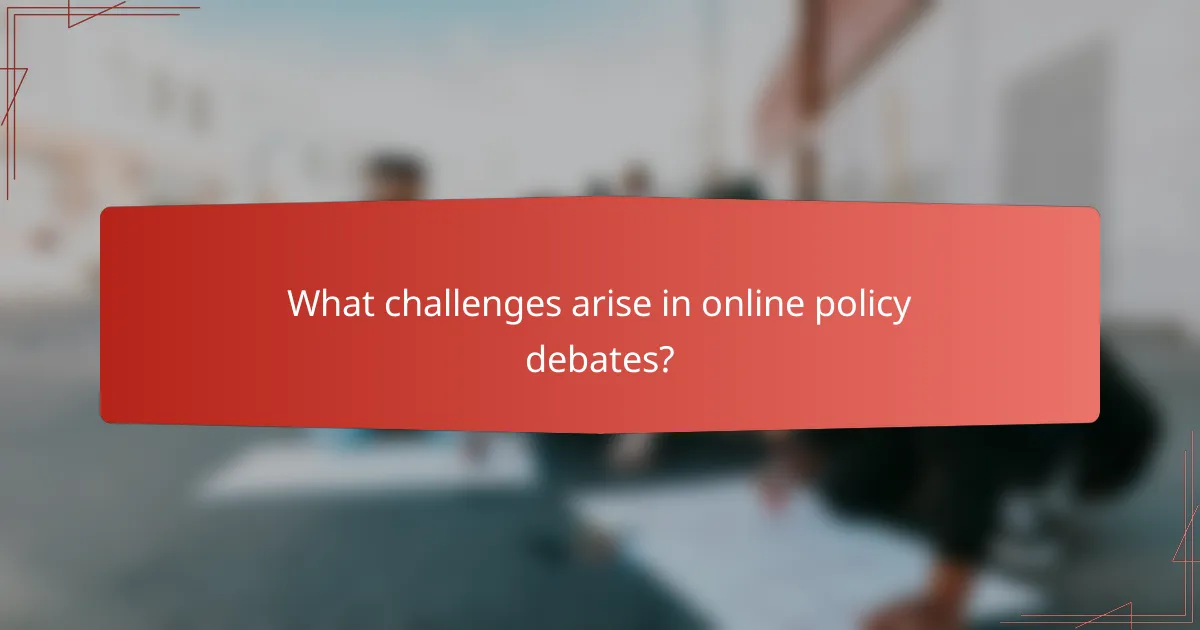
What challenges arise in online policy debates?
Online policy debates present unique challenges, primarily related to technical issues and maintaining participant engagement. These factors can significantly impact the quality and effectiveness of the debate experience.
Technical issues affecting participation
Technical problems can hinder participation in online policy debates, including poor internet connectivity, software glitches, and hardware limitations. Participants may experience delays, audio issues, or video disruptions, which can detract from the debate’s flow and clarity.
To mitigate these issues, ensure that all participants have access to reliable internet connections and compatible devices. Conducting a technical check before the debate can help identify potential problems, allowing for adjustments to be made in advance.
Maintaining engagement in virtual settings
Engagement in virtual policy debates can be challenging due to the lack of physical presence and distractions in participants’ environments. To keep participants focused, it’s essential to create an interactive atmosphere that encourages active participation.
Utilizing features like polls, breakout rooms, and real-time Q&A sessions can enhance engagement. Additionally, setting clear expectations for participation and encouraging speakers to maintain eye contact with the camera can help foster a more connected experience.
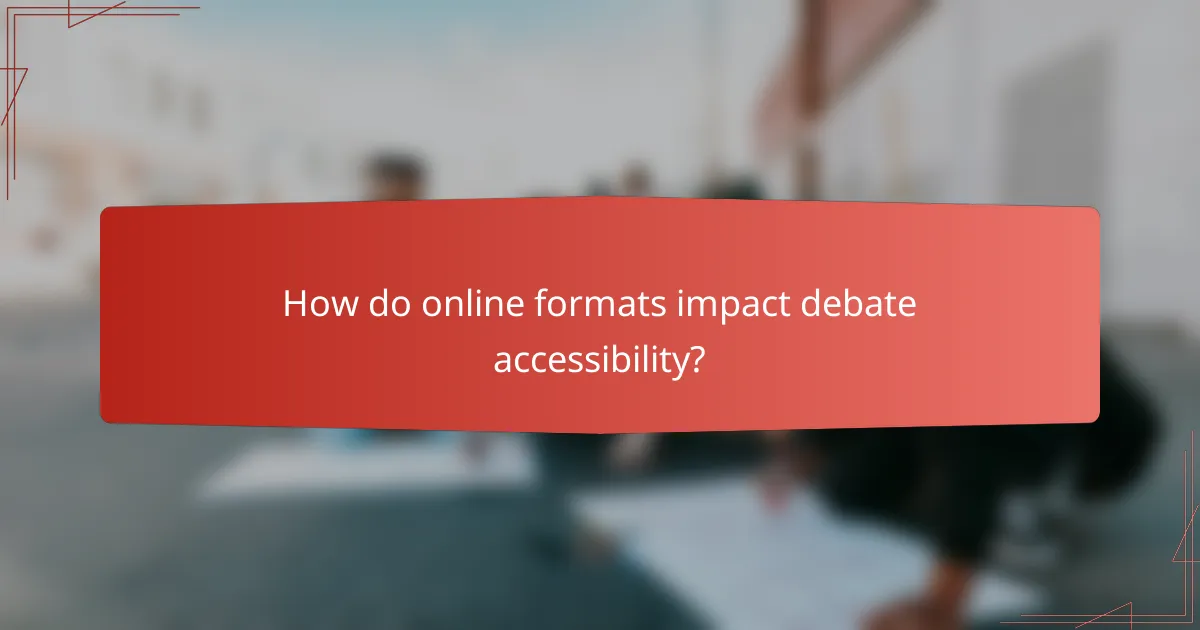
How do online formats impact debate accessibility?
Online formats significantly enhance debate accessibility by removing geographical barriers and allowing more participants to engage. This shift enables a diverse range of voices and perspectives, fostering a richer debate environment.
Wider reach for participants across regions
Online debate formats facilitate participation from individuals in various regions, including those who may have been previously excluded due to travel costs or logistical challenges. By utilizing platforms that support virtual meetings, debates can attract participants from different countries and communities.
This wider reach can lead to a more inclusive debate atmosphere, where diverse viewpoints contribute to discussions. For instance, a debate hosted in the United States can easily include participants from Europe, Asia, or Africa, enriching the dialogue with varied cultural insights.
Cost-effectiveness for participants
Engaging in online debates often incurs lower costs compared to traditional formats, where travel and accommodation expenses can be significant. Participants can save money on transportation and lodging, making it feasible for more individuals to join.
Many online platforms are free or have minimal fees, further reducing financial barriers. This cost-effectiveness can encourage participation from students and individuals who may have limited resources, promoting broader engagement in debate activities.
Flexibility in scheduling
Online debate formats offer greater flexibility in scheduling, accommodating participants’ varying time zones and commitments. This flexibility allows organizers to set debate times that work for a larger audience, increasing overall participation.
For example, a debate could be scheduled in the evening for one region while being early morning for another, allowing participants to join at convenient times. This adaptability can lead to higher attendance and more dynamic discussions.



